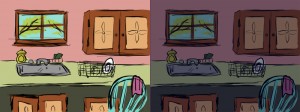Sundown
This would be a game about Sundowner’s Syndrome. The disease itself is a form of dementia/Alzheimer’s wherein the patient is completely normal during the day but at night exhibits symptoms similar to Alzheimer’s. In the game the player would assume the role of an elderly woman on the verge of being sent to a nursing home. As you live throughout the day, you will perform various mundane tasks. As the sun sets, the tasks become stranger and more out of place, such as having dinner with your late husband or shoveling the driveway to clear away snow in the middle of August. Your daughter will begin to ask questions about your life, and you will have to remember what happened correctly. Your daughter may try to ask you trick questions to see if you’re lying or not, and if she becomes too suspicious she will send you to a nursing home. There will only be one image in the story, depicting your kitchen. The image will change slightly to reflect the situation, i.e. time of day / weather.
–Promptly at 5:15AM Margaret got out of bed to begin her day. Last night she had gone to bed rather early as she hadn’t been feeling well but a good night’s sleep seemed to have done the trick. Feeling a bit peckish, she went to the kitchen.
+ Make coffee
+ Make eggs
——————–
Faulty
For my second idea, I thought it would be interesting to make a game without visuals, but that relies heavily on visualization. In the game you would play as a piece security machinery that works at the entrance to a very important government facility. It is your job to sort through everyone’s loose belongings before they enter the building, and destroy anything that might be deemed a threat. The only problem is that your recognition software is on the fritz, and recognizes objects incorrectly, leaving you to use your limited sentience to determine what the object might actually be, and whether or not it is threatening. If you’re not careful and ban too many nonthreatening objects, employees will complain and you will be scrapped. If you miss too many, it can have dire consequences for the company, and you will be scrapped. The game will exercise the player’s creativity and associative abilities, and their ability to recognize/rationalize threatening paraphernalia.
